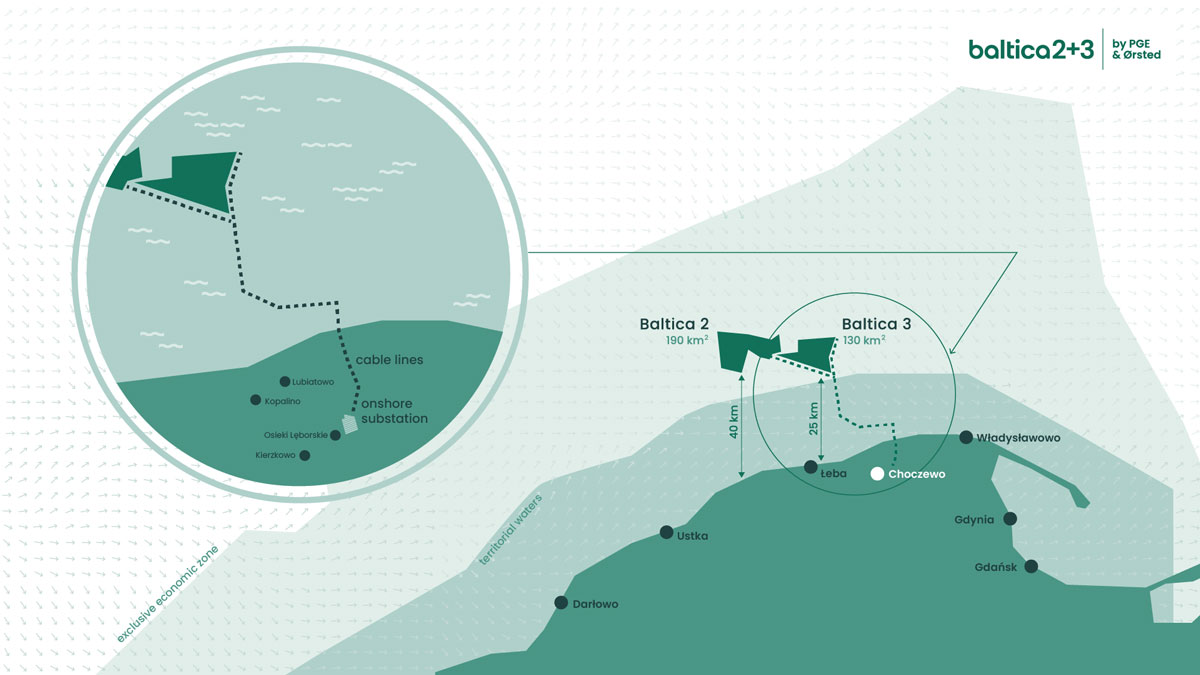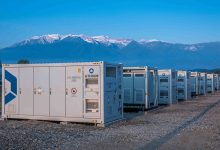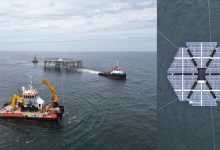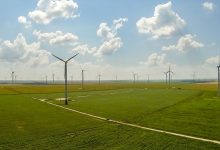EIB to Support Development of Baltica Offshore Wind Farm
The European Investment Bank (EIB) approved in principle the financing of the Baltica Offshore Wind Farm (OWF) project to be implemented by the PGE Group. The total financing package amounts to EUR 1.4 billion. This is a significant step towards ensuring an optimal financing structure that will enable the construction of PGE’s first offshore wind farms in the Baltic Sea.
The project will consist of several stages – for each of the stages of the Baltica OWF – stages Baltica 2 and Baltica 3 – there is one tranche to be disbursed in the Project Finance formula in the amount of up to EUR 350 million, and one tranche to be disbursed based on guarantees from financial institutions, banks, or export credit agencies.
Accelerating the energy transformation is a priority, which is why the EIB Group and the European Commission established the REPowerEU initiative. This aims to make the European Union independent of Russian energy resources and move the EU energy sector towards renewable energy. The Baltica Offshore Wind Farm project meets these goals.
“Obtaining a preliminary credit decision from the European Investment Bank is a significant step for financing the construction of the largest offshore wind farm in the Baltic Sea. The presence of a recognized and experienced international financial institution in financing the project is a signal that we are a reliable partner for financial institutions, the projects we run meet the highest standards, and the interest of the financial sector in cooperation with PGE in the field of offshore wind energy is really high,” said Wojciech Dąbrowski, President of the Management Board of PGE Polska Grupa Energetyczna.
“Diversification of energy sources and independence from fossil fuels are key tasks for Poland and the European Union, and Baltica Offshore Wind Farm is a very important project implementing these goals. Supporting energy transition is a priority for the EIB as it accelerates green economic development and supports labour market,” Vice-President of the EIB, prof. Teresa Czerwińska, added.
PGE is building the Baltica OWF together with its Danish partner – Ørsted. The project with a total capacity of approx. 2.5 GW consists of two stages – Baltica 2 with a capacity of approx. 1.5 GW, which is scheduled to be commissioned in 2027, and Baltica 3 with a capacity of approx. is planned by the end of this decade.
About PGE
PGE Polska Grupa Energetyczna is the largest power company in Poland. It guarantees safe and stable electricity and heat supplies to over 5.5 million customers and is leading in the green transition in Polish energy sector. The group’s share in electricity production in Poland is approximately 40%. As one of the first utilities in the region PGE announced a goal of climate neutrality by 2050. The investment plan of the PGE Group will implement an ambitious programme of building the largest domestic offshore wind farms in the Baltic Sea. By 2030, two PGE Group offshore farms will be built with a total capacity of 2.5 GW and another 1 GW after 2030. By 2040 the capacity of PGE’s offshore wind farms will reach at least 6.5 GW. By 2030 the PGE Group intends to build 3 GW in photovoltaics and expand its onshore wind farm portfolio by at least 1 GW. Large-scale projects will be accompanied by a complementary energy storage programme of at least 0.8 GW, which will increase capability to connect renewable energy sources and support safe and flexible operation of the power system. In addition, in cooperation with a Polish and Korean partner, PGE will build a nuclear power plant with a capacity of approx. 2,800 MW.
About EIB
The EIB Group is the EU’s long-term financing institution, owned by its member states. It comprises of the European Investment Bank (EIB) and the European Investment Fund (EIF). They finance sound investments that contribute to EU policy goals, including social and territorial cohesion, and the just transition to climate neutrality.
The EIB was the first multilateral development bank to end support for fossil fuels and has committed to support €1 trillion in climate investment this decade. Over half of the EIB Group’s lending in 2022 was devoted to climate and environmental sustainability projects, while almost half of the EIB’s financing inside the EU was signed for projects in cohesion regions, where per-capita income is lower, highlighting the Bank’s commitment to equitable growth.
EIB and energy security
Over the past decade, the European Investment Bank Group has channelled almost €100 billion into the EU energy sector. These timely investments are now helping Europe weather the crisis triggered by the abrupt cut in Russian gas supplies. In 2022 the EIB has signed financial support totalling more than €20.8 billion for projects in energy efficiency, renewables, electricity, and storage inside the European Union, thus helping strengthen the resilience of the European economy.
In July, the EIB’s Board of Directors decided to raise the Group’s clean energy financing volumes to unprecedented levels in support of the REPowerEU objective of ending Europe’s dependency on Russian fossil-fuel imports. €45 billion will be invested over the next five years, on top of the EIB’s already robust support for the energy sector in the European Union. It is estimated that the dedicated REPowerEU package will mobilise an additional €150 billion in additional investment by 2027, thus making a substantial contribution to Europe’s energy independence and the EIB Group’s target to mobilise €1 trillion this decade in climate financing.






